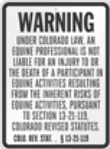This is just a legal question that I am interested in so please just address the legality. The boarders all know the situation/risks.
The footing in our arena has been bad for several years and the boarders have complained to management often - it is very uneven and where the base is exposed it is very hard and slick. A couple of years ago a couple of horses slipped and fell (luckily no one/horse was hurt) and management did make an attempt to fix the problem but it didn’t last long. Recently another horse slipped and fell while being led at the walk and was injured, requiring several vet visits. Question has come up as to whether or not barn management is responsible for vet bills as this has been a known problem. Or are boarders responsible as they know the risk to riding there?
I’m just very curious about the situation. I opt to ride in the field as much as possible, but was wondering as that is the “buzz” around the barn.


